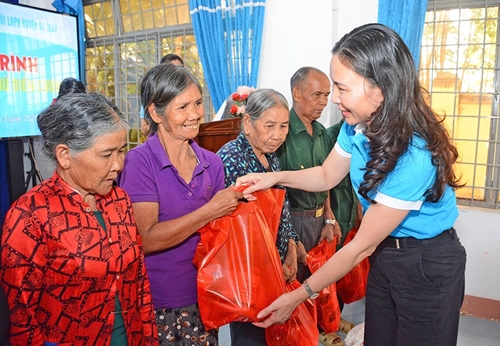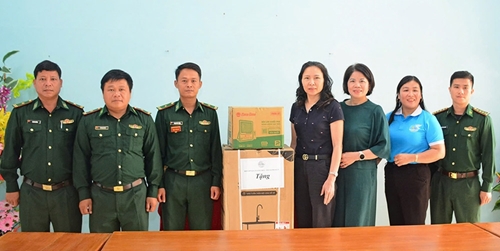One of the local women receiving the support from this program is Y Blim in Grap village, border commune of Mo Rai, Sa Thay district, Kon Tum province. Thanks to the donation from the Women’s Association of Long Bien district, Hanoi through the “Accompanying women in border areas” program, she is able to build a new house. Now she feels happy since her family is about to leave behind her makeshift house of less than 10 square meters, leaky during the rainy season and hot during the dry one.
Vice Chairwoman of the Women’s Association of Long Bien district Chu Thi Hue highlighted the significance of the program. She said that it brings not only material gifts, but also heartfelt sentiments from women and citizens of the capital city to those living in border areas.
    |
 |
|
Women in border commune of Ro Koi receiving gifts from representatives of the Women’s Association of Long Bien district |
According to Hue, in addition to donation for the construction of the house for Y Blim, the Women’s Association of Long Bien district also gifted a house to Y Tring in Kdin village, Mo Rai commune; handed over 100 gifts, worth VND 500,000 each to policy beneficiaries, women in difficult circumstances, and families with meritorious service; and donated 20 bicycles to students in Mo Rai and Ro Koi communes of Sa Thay district. Moreover, the Women’s Association of Long Bien district and the Beautiful Soul Foundation presented laptops, water purifiers, and solar lights to the Sa Thay Women’s Association, Mo Rai Border Post, Ia Dom Border Post, and Ro Koi Border Post of the Kon Tum provincial Border Guard Command. They also visited kindergartens and families of women’s association members in Mo Rai commune. The total value of the program was nearly VND 280 million.
Kon Tum province shares over 292-kilometer border section with Laos and Cambodia. The border region includes 99 villages and 13 communes across four districts of Sa Thay, Dak Glei, Ngoc Hoi, and Ia H’Drai. These are areas with underdeveloped infrastructure, low living standards, and high poverty rates, with over 23% of households are poor or near poor. Among the population, women and children often face many disadvantages. Noting this situation, the Kon Tum provincial Border Guard Command, in collaboration with local Party Committee, authorities, political-social organizations, and businesses, has mobilized resources to help people in border areas in socio-economic development. Among these efforts, the “Accompanying women in border areas” program stands out for its deep humanistic meaning and significant practical value.
According to Deputy Political Head of the Kon Tum provincial Border Guard Command Colonel Pham Tien Dung, the program focuses on raising awareness among women and society of family economic development, sustainable poverty reduction, gender equality, child care, and participation in safeguarding national border sovereignty and security; maintaining and developing sustainable livelihood models in border areas; enhancing the effectiveness of activities of grassroots women’s associations; and collaborating in carrying out social welfare initiatives. So far, the Kon Tum provincial Border Guard has coordinated with localities and press agencies to organize hundreds of communication events and developed special columns, fanpages, Zalo and Facebook groups for effective outreach. Together with maintaining and expanding successful economic models, the unit has developed new ones suited to local conditions and collaborated with businesses and organizations to present thousands of gifts to women and children in need in border areas.
    |
 |
|
The delegation of the Women’s Association of Long Bien district hands over gifts to Ro Koi Border Post. |
According to Vice Chairman of the People’s Committee of Ro Koi commune Y Chit, through the ‘Accompanying women in border areas’ program, many women’s families in the border region have escaped poverty and achieved better lives. The program helps build ‘soft power’ and establishes a firm defense-security posture, particularly the people's heart posture in protecting the nation’s border sovereignty and security.
Translated by Tran Hoai